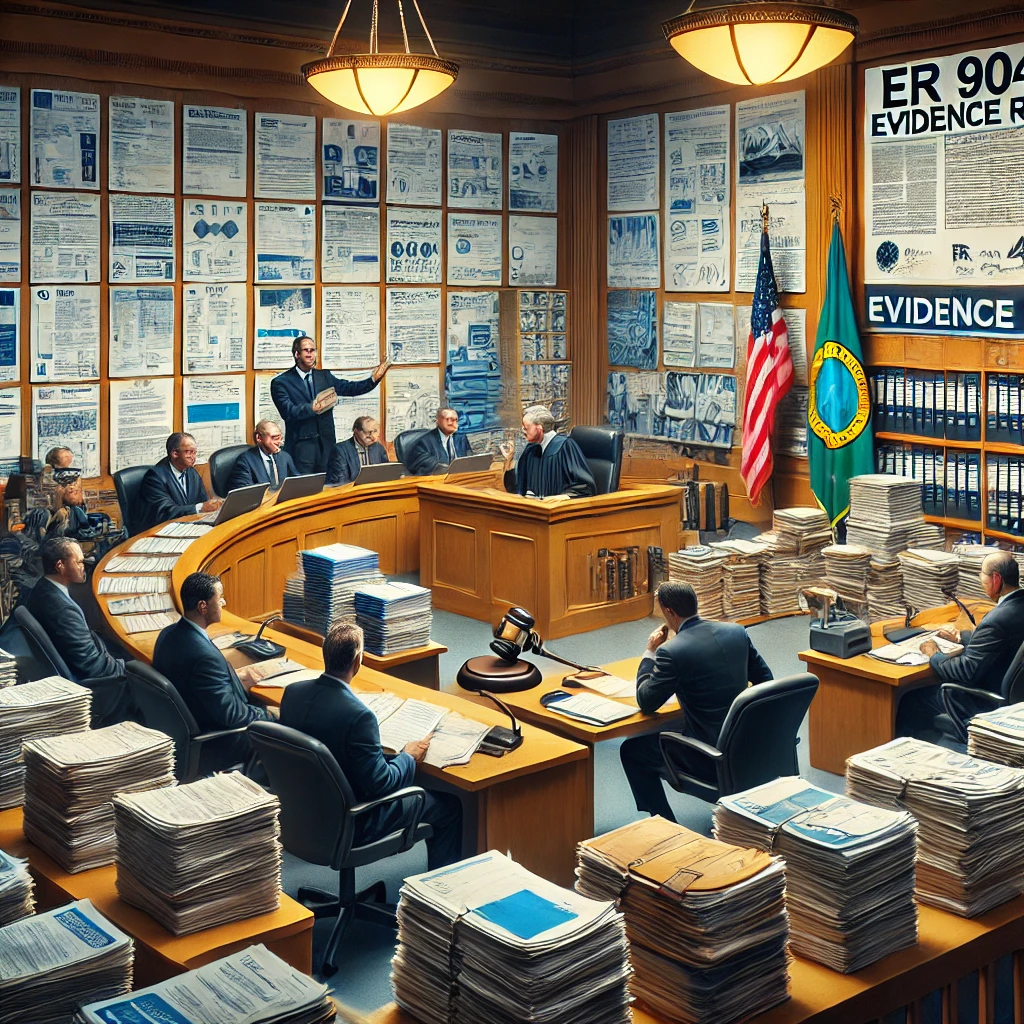Introduction: ER 904 is a critical rule in Washington civil law that streamlines the process of admitting certain documents into evidence. This rule allows specific types of documents to be deemed admissible in court without the need for additional testimony or identification, provided that the proper procedures are followed. Understanding ER 904 is essential for legal practitioners, as it can significantly impact the efficiency and effectiveness of trial preparation. In this article, we will explore the key aspects of ER 904 and how it applies in Washington civil cases.
Key Provisions of ER 904:
- Documents Deemed Admissible: ER 904(a) outlines several types of documents that are considered admissible in civil cases, provided they are proposed in accordance with section (b) of the rule. These documents include:
- Medical and Health Care Records: Bills, reports, charts, and records from hospitals, doctors, nurses, and other health care providers.
- Pharmacy and Medical Supply Bills: Invoices for drugs, medical appliances, and related expenses.
- Property Damage Estimates: Bills or estimates for property damage, including details on whether the repairs were made and the costs involved.
- Official Reports and Government Tables: Weather reports, traffic signal reports, and standard U.S. government tables.
- Visual and Documentary Evidence: Photographs, x-rays, drawings, maps, blueprints, and similar evidence.
- Other Relevant Documents: Any other document not specifically mentioned but related to a material fact with equivalent trustworthiness.
- Notice Requirement: ER 904(b) mandates that any party intending to offer a document under this rule must serve a notice on all parties at least 30 days before trial. This notice must include:
- Numbered Copies of the Documents: The documents being offered must be numbered and accompanied by an index.
- Detailed Index: The index should briefly describe each document and provide the name, address, and contact information of the document’s author or maker.
- Objection to Documents: Under ER 904(c), any party may object to the authenticity or admissibility of the proposed documents within 14 days of receiving the notice. Objections can be made on the basis of:
- Authentication: If a party challenges the document’s authenticity, and the court finds the objection was made without a reasonable basis, the offering party may be awarded expenses and attorney fees.
- Admissibility: Objections to admissibility must be specific, except for relevancy objections, which can be made at trial. Similar to authentication objections, unreasonable objections may result in the awarding of expenses and attorney fees to the offering party.
- Effect of the Rule: ER 904(d) clarifies that this rule does not limit arguments or proof regarding the weight of the evidence. The trier of fact still has the authority to determine the weight of the evidence after considering all the evidence and arguments presented by the parties.
Practical Implications: ER 904 provides a streamlined method for admitting certain documents into evidence, reducing the need for additional testimony or identification. This rule can significantly reduce the time and cost associated with trial preparation, making it an invaluable tool for attorneys in Washington civil cases. However, it is crucial to adhere to the notice and objection procedures to avoid potential pitfalls.
For a complete understanding of the rule, you can review the full text of ER 904 here.
Conclusion: ER 904 is a powerful rule that simplifies the admission of documents in Washington civil cases. By following the proper procedures, attorneys can ensure that their evidence is admitted efficiently, allowing them to focus on the substantive issues of the case.
Additionally, explore our client resources here for more details on how we handle similar cases.
About Blanford Law:
At Blanford Law, we are committed to providing relentless, fair, and honest legal representation. With over 20 years of experience, Ken Blanford founded our firm on the belief that every client deserves respect and the best possible defense, free from assumptions or preconceived notions. If you or someone you know is facing legal challenges, please contact us anytime at 253-720-9304 or email us at info@blanfordlaw.com.

